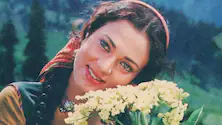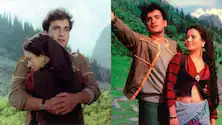By:
Screen
Weekly,
IndiaFM
Wednesday,
September
26,
2007
If
the
Kapoors
are
known
for
their
great
Punjabi
looks
and
flamboyant
style
of
acting,
the
Chopras
are
famous
for
their
romantic
capers
and
star
making
abilities,
the
Barjatyas
for
their
family
pack
films,
the
Roshans
for
scaling
new
creative
and
technical
heights
and
the
belligerent
Bhatts
for
their
realistic
cinema
with
a
dash
of
glamour...these
are
families
that
have
shaped
and
contoured
the
film
industry.
They
have
given
the
industry
producers,
directors,
music
directors
and
actors
for
generations
together.
They
have
changed
the
face
of
Indian
cinema.
A
quick
recap...
KAPOORS
Star-studded
lineage
The
first
film
family,
the
largest
and
longest-surviving
lineage,
the
Kapoors
have
ruled
each
decade
in
filmdom.
Way
back
in
the
1920's
Prithviraj
came
to
Mumbai
from
Peshawar
during
the
silent
era.
His
magnificent
persona
and
colossal
histrionic
talent
won
his
stellar
roles
in
black-and-white
silent
films
and
talkies
-
he
was
in
India's
first
talkie
Alam
Ara,
he
essayed
the
title
role
in
Sikander
and
did
Mughal-E-Azam.
Unlike
his
father
who
played
larger-than-life
roles,
Raj
preferred
to
essay
the
common
man
in
his
films.
The
vagabond
in
Awara,
the
small-town
man
who
flourishes
into
a
card
hustler
in
Shree
420.
The
showman
as
he
was
known
by
his
films
about
youthful
aspirations
launched
his
own
RK
studios
with
Aag
in
1948.
He
ruled
the
industry
with
human
dramas
like
Barsaat,
Chori
Chori
,
Sangam
and
Mera
Naam
Joker,
Prem
Rog
and
Ram
Teri
Ganga
Maili.
Most
deservingly,
he
was
awarded
the
Dadasaheb
Phalke
Award.
Shammi
was
the
Elvis
Presley
of
Bollywood,
his
playboy
image
had
a
winning
run
in
the
'50s
and
'60s
with
Tumsa
Nahin
Dekha,
Junglee
and
Teesri
Manzil.
Romantic
Shashi
was
the
busiest
actor
in
the
'70s
and
'80s.
He
worked
in
multiple
shifts
in
blockbusters
like
Kabhi
Kabhie,
Deewaar,
Trishul
and
Kranti.
He
was
the
first
Indian
star
to
crossover
to
British
and
American
films
like
Householder
and
Siddhartha.
He
produced
his
brand
of
films
under
his
banner
Filmvalas,
like
Kalyug,
36
Chowringhee
Lane
and
Utsav-
which
were
all
critically
acclaimed.
From
the
third
generation,
Randhir
Kapoor
sparked
briefly
in
Kal
Aaj
Aur
Kal
,
Jawani
Diwani.
His
directorial
venture
Henna.
Rishi
burst
upon
the
scene
with
the
teen
romance
Bobby
in
'73,
and
he
continued
to
romance
pretty
heroines
on
screen
well
into
the
late
'90s.
He
was
rightly
hailed
as
the
forever-youthful.
Rajiv,
the
youngest
of
Raj's
sons
debuted
in
Ek
Jaan
Hain
Hum
and
then
directed
Prem
Granth
for
the
R
K
banner.
The
fourth
generation
of
Kapoors
was,
surprisingly
headed
by
Karisma
and
Kareena,
because
acting
was
considered
a
taboo
for
Kapoor
women.
They
broke
all
the
barriers
and
flaunted
their
glamorous
personae.
Karisma's
Raja
Hindustani,
Biwi
No.
1,
Dil
To
Pagal
Hai
and
Zubeida
depicted
the
range
of
her
acting.
Kareena's
attitude
combined
with
her
dazzling
glamour
make
her
a
strong
contender
for
the
numero
uno
spot
-
with
topping
projects
like
Kabhi
Khushi
Kabhie
Gham...,
Asoka,
Chameli
and
Omkara.
Ranbir,
the
latest
entrant
is
Rishi's
younger
son.
He
debuts
in
Sanjay
Leela
Bhansali's
Saawariya,
the
first
of
Sony's
Indian
productions.
CHOPRAS
Multi-star
Magic
From
Lahore
to
Mumbai,
their's
is
the
success
story
that
continues
to
lure
hordes
of
Punjabis
to
filmdom.
Baldev
Raj
Chopra,
a
film
journalist,
turned
a
filmmaker
then
formed
his
own
production
house
B
R
Films
in
1955
with
Ek
Hi
Raasta.
He
handled
women's
issues
through
his
films
and
added
hits
to
his
kitty
with
Gumrah,
Dhund,
Pati
Patni
Aur
Woh,
Insaf
Ka
Tarazu
and
Nikaah.
Keeping
up
with
the
changing
times,
he
ventured
into
tele-serials
with
Mahabharat,
the
mythological
serial
with
his
director-son,
Ravi
Chopra.
Ravi,
on
his
part
had
earlier
directed
films
like
Aaj
Ki
Awaz.
He
returned
to
the
silver
screen
with
Baghban,
penned
by
his
octogenarian
father.
He
made
Baabul
recently
and
then
released
the
colorised
version
of
his
father's
Naya
Daur.
Ravi's
son
is
said
to
be
training
in
the
wings
to
take
off
as
a
director
very
soon.
Lahore-born
Yash
Chopra
joined
his
elder
brother
B
R
as
an
assistant
director
in
Mumbai.
He
directed
his
first
venture,
Dhool
Ka
Phool
for
his
brother
and
with
his
Waqt
he
unleashed
the
power
of
multi-starrers.
In
'71,
Yash
setup
Yash
Raj
Films
and
made
Daag
under
his
banner.
Reflecting
the
angst
of
the
frustrated
youth
of
the
'70s,
he
made
Deewaar.
Forging
ahead
with
the
lavish
family
drama
Kabhi
Kabhie,
later
with
Chandni,
he
had
chiffon-draped
heroines
epitomise
his
films.
So
much
was
his
penchant
for
shooting
in
the
scenic
Swiss
locales
that
the
Swiss
Government
has
even
a
lake
after
him!
Yash
is
everything
his
films
aren't.
Glamour
and
opulence
may
be
the
mark
of
his
films,
but
personally
he's
simple
and
easy-going
that
it
is
hard
to
believe
that
he
is
the
high
priest
of
romance.
The
septugenarian
last
directed
a
cross-border
romance
Veer
Zaara.
His
elder
son,
the
reclusive
Aditya
Chopra,
made
the
most
of
his
marketing
savvy
in
tranforming
Yash
Raj
Films
into
an
entertainment
conglomerate.
Adi
also
made
the
longest
running
Indian
romance
Dilwale
Dulhania
Le
Jayenge
before
tapping
the
youthful
zest
of
fresh
directorial
talent.
Like
his
father,
he's
produced
some
big
money-spinners
with
new
directors
viz.
Hum
Tum,
Dhoom
and
Bunty
Aur
Babli.
He
seems
to
have
inherited
his
father's
Midas'
touch.
Yash's
youngest,
hunky
Uday
acts
mostly
in
home-banner
films.
His
comic
caper
in
Dhoom
turned
out
to
be
his
ticket
to
fame.
ROSHANS
Package
deal
In
film
parlance,
the
combination
of
a
director,
music
director
and
hero
is
considered
to
be
a
complete
package
deal.
Well,
the
Roshans
are
just
that
and
much
more.
Something
that
Senior
Roshan
may
never
envisaged
as
a
struggling
music
director
back
in
the
late
'40s.
Roshan
struck
big-time
in
the
'50s
with
his
scores
based
on
Indian
classical
melodies.
Na
to
karavaan
ki
talaash
hai
...
(Barsaat
Ki
Raat),
Jo
vaada
kiya
woh
nibhana
padega
...
(Taj
Mahal)
and
Laaga
chunari
mein
daag
...
(Dil
Hi
To
Hai)
are
cult
songs
from
some
of
his
ageless
scores.
Roshan
however,
never
compromised
on
quality
and
retained
the
purist
vein
in
his
music.
His
son
Rakesh
acted
in
about
70
films
but
it
wasn't
until
he
launched
his
banner
Filmkraft
and
began
making
films
did
he
come
into
his
own.
Rakesh
realised
the
lucky
charm
of
the
alphabet
'K'
much
before
Ekta
Kapoor
or
Karan
Johar.
All
his
films
necessarily
begin
with
K
-
from
Khudgarz,
Kishen
Kanhaiya,
Karan
Arjun,
Kaho
Naa
...
Pyaar
Hai,
Koi...Mil
Gaya
to
it's
sequel,
Krrish.
Aap
Ke
Deewane,
his
first
production,
was
perhaps
the
only
exception
to
his
K-fixation
of
titles.
Rakesh
has
innovated
in
terms
of
stories,
locations
and
genres.
Krrish,
the
first
sequel
of
modern
times,
started
a
whole
new
avalanche
of
sequels.
His
brother,
Rajesh
shot
to
fame
with
his
westernised
score
in
Julie.
Unlike
his
father,
Rajesh
is
heavily
influenced
by
Western
music
and
he
considers
his
fusion
scores
his
forte.
He
usually
gives
music
to
his
brother's
films.
Rakesh's
light-eyed,
eleven-digited
son
struck
the
silver-screen
like
a
bolt
of
lightening.
Industrious
and
talented,
Hrithik
started
off
as
his
father's
assistant
reading
out
dialogue
sheets
to
artistes
in
Karan
Arjun
and
Koyla.
At
the
turn
of
the
century,
he
debuted
as
the
hero
of
Kaho
Naa..
Pyaar
Hai.
Since
then,
he's
considered
an
A-list
actor.
He
acquires
a
new
skill
for
nearly
every
film
of
his,
like
martial
arts
for
Krrish,
military
stances
for
Lakshya
and
the
latest
dance
techniques
for
Dhoom:2.
He
has
sustained
chronic
injuries,
thanks
to
his
obssession
for
doing
his
own
stunts
in
films.
He
didn't
hesitate
playing
negative
characters
in
Mission
Kashmir
and
Fiza
at
the
beginning
of
his
career.
Never
to
get
trapped
in
an
image,
this
new
age
actor
has
now
donned
the
majestic
avatar
of
Akbar
for
his
latest
venture,
Jodhaa
Akbar.
The
Roshans
are
linked
to
another
big
film
family
of
Feroz
and
Sanjay
Khan
through
Hrithik's
marriage
to
Suzzane,
the
daughter
of
veteran
actor-filmmaker
Sanjay
Khan.
By
far,
he's
the
most
promising
and
inventive
of
the
new
crop
of
actors.
Incidentally,
he
inherits
the
musical
talent
of
his
grandfather
and
he
can
play
any
musical
instrument
by
sheer
instinct!




 Click it and Unblock the Notifications
Click it and Unblock the Notifications























